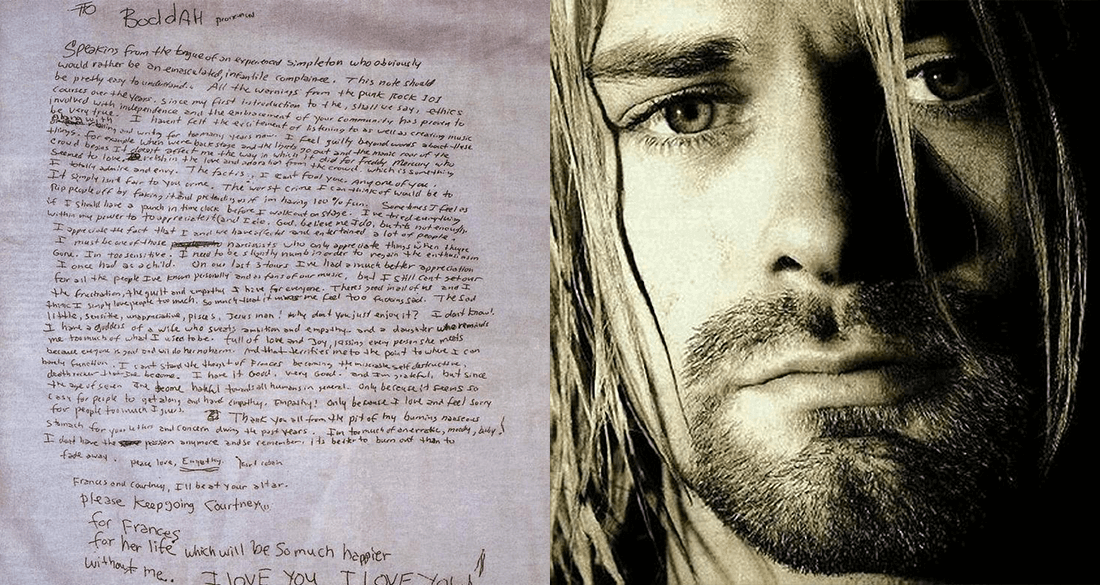On April 8, 1994, the world lost one of its most influential musicians, Kurt Cobain. His suicide sent shockwaves through the music industry and left fans grappling with the harsh realities of fame, mental health, and the pressures of success. The suicide letter Kurt Cobain left behind became a haunting artifact, offering a glimpse into the mind of a troubled genius. Today, we're diving deep into the significance of Kurt Cobain's suicide letter, exploring its meaning, context, and lasting impact.
It’s hard to put into words just how monumental Kurt Cobain was to the music scene in the early '90s. He wasn’t just a singer or guitarist; he was a symbol of rebellion, authenticity, and raw emotion. His band, Nirvana, changed the face of rock music forever with their groundbreaking album "Nevermind." But behind the fame and success lay a man grappling with inner demons that ultimately led to his tragic end.
This article aims to shed light on the events surrounding Kurt Cobain’s death and the letter he left behind. We’ll explore the contents of his suicide letter, its emotional weight, and what it reveals about his struggles. By understanding the context of his life, we can better grasp the complexity of his decision and honor his legacy in a way that resonates with both fans and those who seek to learn from his story.
Before we dive into the details, let’s take a moment to reflect on why this topic matters so much. For many, Kurt Cobain wasn’t just a musician—he was a voice for the disenfranchised, a beacon of hope for those feeling lost in the chaos of life. His suicide letter serves as a reminder of the importance of mental health awareness and the need to support those around us who may be silently struggling.
Table of Contents
- Kurt Cobain Biography
- Early Life and Background
- The Rise of Nirvana
- Kurt Cobain's Mental Health Struggles
- Drug Addiction and Its Role
- The Kurt Cobain Suicide Letter
- Impact on Fans and the Music Industry
- Analysis of the Letter
- The Legacy of Kurt Cobain
- Conclusion and Reflection
Kurt Cobain Biography
Before we delve into the specifics of his suicide letter, it’s essential to understand who Kurt Cobain was as a person. Born on February 20, 1967, in Aberdeen, Washington, Cobain grew up in a small town where music became his solace. His childhood was marked by turbulence, including his parents' divorce when he was just eight years old. This early trauma shaped much of his worldview and influenced his later work.
As a teenager, Cobain developed a passion for punk rock and grunge music, which would eventually become the foundation of his career. He formed Nirvana with bassist Krist Novoselic in 1987, and the rest, as they say, is history. But beneath the surface of his meteoric rise to fame lay a deeply sensitive and introspective individual.
Early Life and Background
Growing up in Aberdeen, Kurt Cobain faced numerous challenges that contributed to his complex personality. His parents' divorce left a lasting impact on him, and he often felt like an outsider in his own family. Music became his refuge, and he spent countless hours practicing guitar and writing lyrics. Despite his talent, he struggled to fit in at school and often clashed with authority figures.
By the time he reached adulthood, Cobain had already developed a reputation as a rebellious spirit. His love for music, however, remained unwavering. He dropped out of high school and pursued his passion full-time, eventually forming Nirvana with Novoselic. Little did he know that this decision would change his life forever.
The Rise of Nirvana
Nirvana burst onto the music scene in the early '90s with their debut album "Bleach," but it was their second album, "Nevermind," that catapulted them to international stardom. Featuring the iconic track "Smells Like Teen Spirit," the album became a cultural phenomenon and is often credited with bringing grunge music into the mainstream.
However, the sudden fame brought with it immense pressure. Cobain found himself thrust into the spotlight, a position he was never fully comfortable with. He often expressed frustration with the expectations placed upon him and the commercialization of his art. This internal conflict would play a significant role in his eventual downfall.
Kurt Cobain's Mental Health Struggles
Mental health issues plagued Kurt Cobain throughout his life. He suffered from chronic depression, anxiety, and physical pain, much of which stemmed from an undiagnosed stomach condition. These struggles were compounded by the pressures of fame and the public scrutiny he faced daily.
Despite his outward success, Cobain felt increasingly isolated and disconnected from the world around him. In interviews, he spoke candidly about his feelings of inadequacy and the weight of responsibility that came with being a cultural icon. His lyrics often reflected these emotions, offering a window into his inner turmoil.
Drug Addiction and Its Role
In addition to his mental health issues, Kurt Cobain battled a severe heroin addiction. Many believe that his substance abuse was a coping mechanism for dealing with the stress of fame and the pain he experienced. Unfortunately, this addiction ultimately contributed to his demise.
His friends and family tried to intervene on numerous occasions, but Cobain’s struggle with addiction proved too powerful to overcome. The combination of his mental health issues and drug use created a perfect storm that ultimately led to his tragic end.
The Kurt Cobain Suicide Letter
The suicide letter Kurt Cobain left behind is perhaps the most poignant artifact of his life. Written on April 4, 1994, just days before his body was discovered, the letter provides a glimpse into his final thoughts and feelings. Addressed to his imaginary childhood friend "Boddah," the letter is both heart-wrenching and deeply personal.
In the letter, Cobain expresses his gratitude for those who supported him but also acknowledges the immense pain he felt. He writes about feeling "worn out and emotional" and describes his life as a "million dull colors." The letter has been the subject of much analysis and debate, with fans and experts alike trying to decipher its meaning.
Impact on Fans and the Music Industry
Kurt Cobain’s death left an indelible mark on both his fans and the music industry as a whole. For many, he was more than just a musician—he was a symbol of authenticity and honesty in an increasingly commercialized world. His passing served as a wake-up call for the music industry, highlighting the dangers of fame and the importance of mental health awareness.
Fans around the world mourned his loss, and tributes poured in from all corners of the globe. Nirvana’s music continued to resonate with new generations, ensuring that Cobain’s legacy would live on. His death also sparked important conversations about the toll that fame can take on individuals and the need for greater support systems for artists.
Analysis of the Letter
When analyzing Kurt Cobain’s suicide letter, it’s important to consider the context in which it was written. At the time, Cobain was deeply entrenched in a cycle of addiction and despair, and his words reflect this state of mind. The letter is filled with raw emotion and vulnerability, offering a rare glimpse into the psyche of a troubled genius.
Some key points from the letter include:
- His gratitude for those who supported him, particularly his wife, Courtney Love, and their daughter, Frances Bean.
- His frustration with the expectations placed upon him by the music industry and the media.
- His feelings of isolation and disconnection from the world around him.
- His belief that he had lost his passion for music and no longer found joy in creating art.
These themes have resonated with fans and experts alike, sparking discussions about the pressures of fame and the importance of mental health.
The Legacy of Kurt Cobain
Despite his untimely death, Kurt Cobain’s legacy continues to inspire new generations of musicians and fans alike. His influence on the music industry cannot be overstated, and his band, Nirvana, remains one of the most iconic groups in rock history. But Cobain’s legacy extends beyond music; he became a symbol of authenticity and honesty in an increasingly superficial world.
His suicide letter serves as a powerful reminder of the importance of mental health awareness and the need to support those struggling with addiction and depression. By sharing his story, we can honor his memory and ensure that his voice continues to be heard.
Conclusion and Reflection
In conclusion, the suicide letter Kurt Cobain left behind is a tragic yet important document that offers insight into the mind of a complex and troubled genius. Through his words, we gain a deeper understanding of the pressures he faced and the struggles he endured. His story serves as both a warning and a call to action, reminding us of the importance of mental health awareness and the need to support those around us.
As we reflect on Kurt Cobain’s life and legacy, let us not forget the lessons his story teaches us. Let us strive to create a world where artists and individuals feel supported and valued, where mental health is prioritized, and where the pressures of fame do not overshadow the humanity of those who bear its burden.
So, if you’ve been moved by this article, take a moment to share it with someone you care about. Let’s keep the conversation going and work together to make a difference. Because in the end, that’s what Kurt Cobain would have wanted—to leave the world a little better than he found it.


